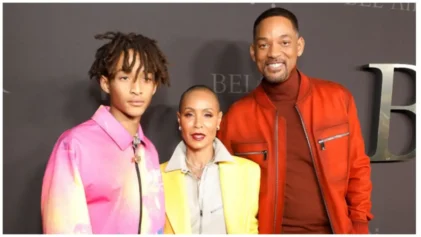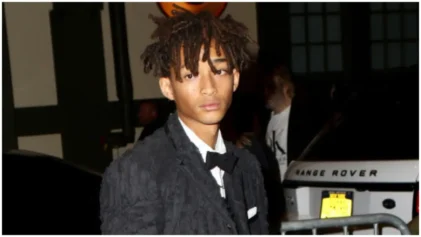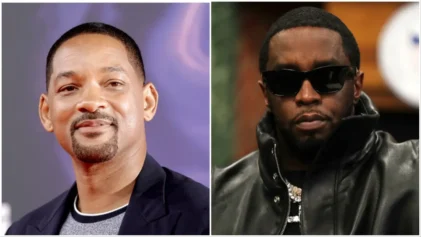The structure of “After Earth” is as simple as a board game: Kitai (Jaden Smith) must traverse a preselected path between the crash site and the tail, avoiding obstacles along the way.
These obstacles include super-predators who have evolved in ways dangerous to humans (a pack of slavering leopard-like hyenas, a bird of prey roughly the size of a jeep); an insectoid alien that can smell human fear; and extreme weather conditions (for reasons not well explained, the Earth freezes over completely every night, so Kitai can survive only by locating geothermal pockets of warmth).
For most of his journey, the boy is accompanied virtually by his dad’s voice and face (Will Smith) on his naviband, a device he wears on a cuff around his arm. This paternal Panopticon, augmented by another camera on Kitai’s back and still more in the air, enables Cypher to observe every last detail of his son’s behavior.
When Kitai lies about how many oxygenated breathing capsules he has left (he’s broken some in a fall), Raige père makes him put his money where his mouth is and display the remaining capsules on screen. I’m not sure whether Shyamalan intended this middle section to be a commentary on parental surveillance in the age of Facebook, but I can imagine how those cumulative busted-by-dad moments (and young Kitai’s eventual act of rebellion) might resonate with teenage viewers.
In the last half-hour, after Kitai slips the bounds of his father’s tech-assisted overparenting, the movie gives full voice to its animating philosophy, which resides somewhere at the convergence point of Life of Pi, Dianetics, and Stuart Smalley’s daily affirmations.
Fear is not real; be in the now; you had the power in you all along. In the climactic scene, cut off from communication with Cypher, Kitai performs a kind of channeling act in which his father’s voice, now internalized as his own common sense, talks him toward a solution which I won’t detail except to say that it involves some of the most triumphantly phallic use of technology since Luke Skywalker first brandished a light saber.
Kitai’s dad-assisted apotheosis serves as an almost too-precise metaphor for what’s been happening the whole movie, with the hardworking but less than mesmerizing Jaden Smith standing in as proxy action hero for his sacrificially self-sidelined father. In his defense, the kid is saddled with a task that even a more experienced actor might have trouble pulling off: He must carry an entire action movie on his slender shoulders, given little more to act opposite than a succession of green-screen predators. Even with his charismatic dad in his earpiece calling the shots, Jaden can’t turn himself into a movie star by sheer force of Will.
Source:.slate.com


